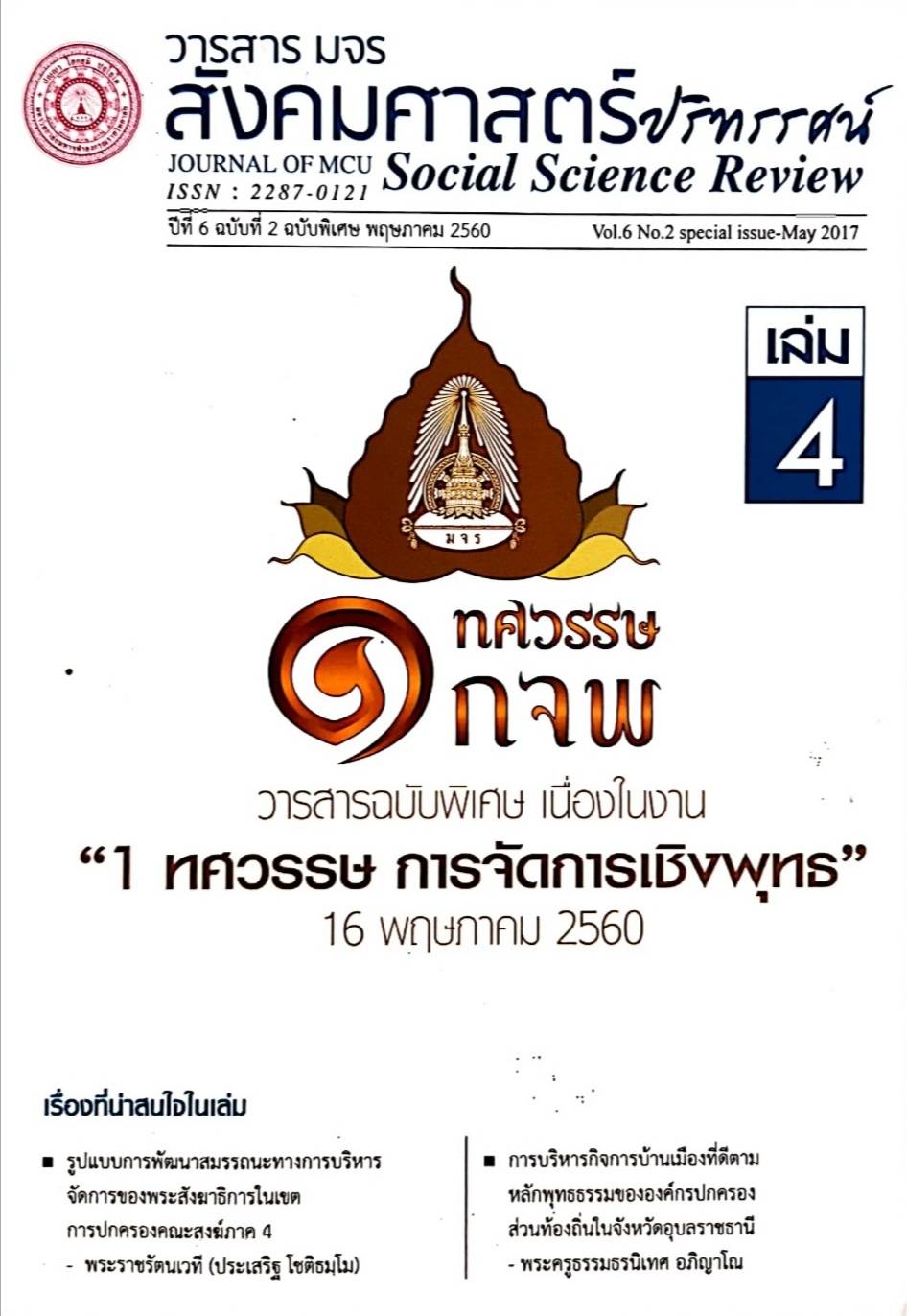เงื่อนไขการฟื้นฟูตลาดน้ำชุมชนผ่านการสร้างความรู้ด้านการท่องเที่ยวเพื่อคนทั้งมวล
คำสำคัญ:
การเข้าถึง; การท่องเที่ยวเพื่อคนทั้งมวล; ตลาดน้าชุมชนบทคัดย่อ
การจัดการท่องเที่ยวตลาดน้าชุมชนเพื่อตอบสนองความต้องการของทุกคนและด้ารงอยู่อย่างยั่งยืนได้เป็นประเด็นที่ท้าทายของชุมชน งานวิจัยน้าร่องนี้จึงมีวัตถุประสงค์เพื่อศึกษาความเป็นไปได้ในการน้าแนวคิดการท่องเที่ยวเพื่อคนทั้งมวลเข้ามาช่วยในการส่งเสริมการพัฒนาการท่องเที่ยวตลาดน้าที่ก้าลังฟื้นฟูเพื่อรองรับการท่องเที่ยวชุมชนเพื่อน้าไปสู่การพัฒนาที่ยั่งยืนและศึกษาถึงเงื่อนไขในการพัฒนาการท่องเที่ยวดังกล่าว ผู้วิจัยใช้วิธีวิทยาฐานรากในการท้าความเข้าใจเงื่อนไขของการพัฒนาการท่องเที่ยว รวมถึงการอบรมเชิงปฏิบัติการและจัดสถานการณ์จ้าลองแก่ผู้มีส่วนได้ส่วนเสียเพื่อสร้างความตระหนักรู้เกี่ยวกับอุปสรรคต่างๆ ในการใช้ชีวิตและเดินทางอย่างอิสระของผู้พิการและผู้สูงอายุ
ผลการวิจัยพบว่า
การพัฒนาการท่องเที่ยวตลาดน้าชุมชนมีเงื่อนไขส้าคัญคือ การมีความรู้สึกเป็นเจ้าของการท่องเที่ยวตลาดน้าของคนในชุมชน ทุนทางสังคมในชุมชนรวมทั้งทุนวัฒนธรรม ความสามารถในตอบสนองต่อความเปลี่ยนแปลงของชุมชน ผู้น้าชุมชนที่เข้มแข็งและสามารถบูรณาการความรู้ได้ และการสามารถน้าแนวคิดไปปฏิบัติอย่างเป็นรูปธรรมอย่างไรก็ดีการพัฒนาการท่องเที่ยวตลาดน้าเพื่อคนทั้งมวลนั้นจะจัดให้มีขึ้นได้ จุดส้าคัญคือปรับเปลี่ยนวิธีคิดของผู้เกี่ยวข้องให้มองเห็นเรื่องการท่องเที่ยวเช่นนี้เป็นเรื่องของสิทธิของมนุษย์ความเท่าเทียมในการได้ท่องเที่ยวอย่างอิสระมิใช่การสงเคราะห์ รวมทั้งพัฒนาเทคโนโลยีในพื้นที่ที่เหมาะสมและมีตัวอย่างที่เป็นรูปธรรมให้ศึกษา ด้วยนัยนี้ การแทรกแซงเพื่อพัฒนายังคงจ้าเป็นต้องเน้นการสร้างความตระหนักรู้อย่างเร่งด่วนเพื่อให้เกิดผลในการพัฒนา
เอกสารอ้างอิง
Buhalis, D., Darcy, S., & Ambrose, I. (2012). Best Practices in Accessible Tourism:Inclusion, Disability, Aging Population and Tourism. Edited by Dimitrios Buhalis, Darcy Simon and Ambrose Ivor. Bristol: Channel View Publications.
Darcy, S & Dickson, T J. . (2009). "A Whole-of -Life Approach to Tourism: The Case for Accessible Tourism Experiences." Journal of Hospitality and Tourism Management 16 : 32-44.
Galan, J. H., (2012). "Best Practice in Accessible Tourism: Inclusion, Disability, Ageing Population and Tourism." Chap. 22 in Accessible Tourism in Spain: Arona and Madrid, edited by Dimitrios Buhalis, Simon Darcy and Ivor Ambrose, 310-321. Bristol: Channel View Publications,.
Muller, L., (2012). "Accessible Tourism in Sweeden: Experiences, Stakeholders, Marketing." Chap. 11 in Best Practice in Accessible Tourism: Inclusion, Disability, Aging Population and Tourism, edited by Dimitrios Buhalis,
Simon Darcy and Ivor Ambrose, 157-167. Bristol: Channel view publications.
World Tourism Organization (UNWTO). (2013). Recommendations on Accessible Tourism. Madrid: World Tourism Organization (UNWTO).
ดาวน์โหลด
เผยแพร่แล้ว
รูปแบบการอ้างอิง
ฉบับ
ประเภทบทความ
สัญญาอนุญาต
ลิขสิทธิ์ (c) 2020 วารสาร มจร สังคมศาสตร์ปริทรรศน์

อนุญาตภายใต้เงื่อนไข Creative Commons Attribution-NonCommercial-NoDerivatives 4.0 International License.
เพื่อให้เป็นไปตามกฎหมายลิขสิทธิ์ ผู้นิพนธ์ทุกท่านต้องลงลายมือชื่อในแบบฟอร์มใบมอบลิขสิทธิ์บทความให้แก่วารสารฯ พร้อมกับบทความต้นฉบับที่ได้แก้ไขครั้งสุดท้าย นอกจากนี้ ผู้นิพนธ์ทุกท่านต้องยืนยันว่าบทความต้นฉบับที่ส่งมาตีพิมพ์นั้น ได้ส่งมาตีพิมพ์เฉพาะในวารสาร มจร สังคมศาสตร์ปริทรรศน์ เพียงแห่งเดียวเท่านั้น หากมีการใช้ภาพหรือตารางหรือเนื้อหาอื่นๆ ของผู้นิพนธ์อื่นที่ปรากฏในสิ่งตีพิมพ์อื่นมาแล้ว ผู้นิพนธ์ต้องขออนุญาตเจ้าของลิขสิทธิ์ก่อน พร้อมทั้งแสดงหนังสือที่ได้รับการยินยอมต่อบรรณาธิการ ก่อนที่บทความจะได้รับการตีพิมพ์ หากไม่เป็นไปตามข้อกำหนดเบื้องต้น ทางวารสารจะถอดบทความของท่านออกโดยไม่มีข้อยกเว้นใดๆ ทั้งสิ้น





